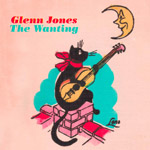|
|
 |
Dusted Reviews
Artist: Glenn Jones Album: The Wanting Label: Thrill Jockey Review date: Sep. 16, 2011 |

|
|
|
 |
For a solo instrumentalist, Glenn Jones is a hell of a songwriter. Songs are supposed to have words, and while no one sings on his, you can hear words rolling off of the hooks cast out by his banjo and acoustic guitars. It’s easy to sing the title of the downbeat slide meditation “Even to Win is to Fail” as he plays the chorus, but just as easy to get those licks stuck in your head whether you think about words or not. It’s as earworm-worthy as a Motown track.
Jones is also quite conscious of being part of a tradition. It’s called American Primitive Guitar. True, he’s written the book on John Fahey (it comes with the boxed set of Fahey juvenilia, Your Past Comes Back To Haunt You), and spent decades as one of the custodians of the legacy of Robbie Basho. But he doesn’t just play like they played (although he certainly can) — he does what they did, namely start with an acoustic guitar and a background in American folk styles, then make emotionally resonant and deeply personal music out of everything you know. He’s written texts for each of the albums he’s made since turning away from the band Cul De Sac seven years ago to focus on being a solo performer, so you don’t have to just sing titles during his songs. And there are texts here: telling you about the tunings he likes to devise and discard, how much he likes to play the banjo, and the places and people that loom in his life. “Twenty-Three Years in Happy Valley, or Life Among the Chickenshit,” for example, is about what you should never say to your boss; it also gives some clues to why he doesn’t seem too apologetic for saying it. But while the title and tale might bring you a smile, neither is essential to appreciate his bright tone and just-so melodic turns.
So what to make of Jones’ choice not to write anything about the title track to The Wanting? It’s tempting to fall back on description and comparison, to point out that the tuning puts a cushioned, springy buzz to a rhythm that would have been all muscle if Fahey had played it, or to note that the melody has that “damn, it’s good to see the sun rise” joy that infused Basho’s best work. Perhaps whatever he’s wishing for or doesn’t have is something too personal or boring to tell. Anyway you perceive it, “The Wanting” is a lovely four-minute mystery.
There are words to explain the record’s biggest departure, which also turns out to be the one thing that doesn’t totally work. At 17:47, “The Orca Grande Cement Factory at Victorville” is the longest thing Jones has ever put on a record, and it’s the first time he’s used drums since Cul De Sac wound down. It’s composed of two fragments that Jones couldn’t make work on their own; he stuck ‘em together, then had drummer Chris Corsano overdub four separate passes through the track. Corsano keeps his free jazz madness on a tight leash, instead illuminating and enlivening Jones’ unending fingerpicking with cymbal swells, rushing brushes and resonant bell accents. What he does is great, but it isn’t enough to justify the tune’s length. I guess that’s why last songs go last.
By Bill Meyer
|







